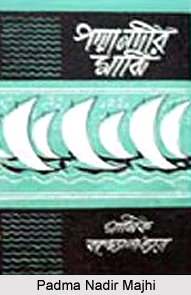 Shifted from the conventional tradition of delineating society as a protagonist, Padma Nadir Majhi concerns about the human beings as the nodal agency of the abstract society. The sinister alleyways of the human mind even among the simple village folk are the principal theme, with which the contemporary society was inextricably involved. Not the tranquility of nature in the lap of village, rather the meanness and malice of the human mind, which was the immediate effect of the post war situation happens to be the key idea of the novel Padma Nadir Majhi.
Shifted from the conventional tradition of delineating society as a protagonist, Padma Nadir Majhi concerns about the human beings as the nodal agency of the abstract society. The sinister alleyways of the human mind even among the simple village folk are the principal theme, with which the contemporary society was inextricably involved. Not the tranquility of nature in the lap of village, rather the meanness and malice of the human mind, which was the immediate effect of the post war situation happens to be the key idea of the novel Padma Nadir Majhi.
Author:
One of the luminaries of the Bengal Literary World in the period of transition, Manik Bandopadhya, was born in 19 May 1908 in West Bengal. Being a true child of his age he experiences the intricacy of human nature and activities and the shrewd spitefulness of the individual. He comprehended that it is not the society, which controls human beings, but it is man, who makes society and has concretized it according to their own needs. As a true observer of the transition period, Manik Bandopadhya, made a piercing analysis of human psychology, and his novels are the vivid depiction of his outlook.
Synopsis:
Delineating a socio-political panorama of 20th century, the story line of Padma Nadir Majhi, develops with the idealistic vision of Hossain, a Bengali Muslim, to build a little utopia on the island of Padma Delta. In the political context of World War II, when the atmosphere was contaminated with the prejudice of Hindu-Muslim intolerance, Hossain, the Muslim, visions his utopia, populated by people like him, irrespective of Hindus and Muslims. It is 1947, when undivided India was on the verge of partition, Hindu fishermen, Kuber, briefly accept the offer of Hossain to ferry some of the community`s cargo from the island. He would be fishing, except that all the fish he usually catches have been driven away by a big storm. In this process of getting the cargo, he gets to see what the colony is like and even though he is fully aware of the gripes of a former colony member and the limitations of it, Kuber shares some of the utopian vision, being influenced by his inner desires. He feels a sense of oneness with those Muslims. They are sharing the same desires and the pathetic pain of getting separated from each other. They belong to the same fishermen folk, who not only share the same livelihood, but also their desires, aspirations and emotions. The tragedy epitomizes, when Kuber returns home pondering on a variety of unfortunate events, happened with him in due course, which provides him with a convincing rationalization to leave his motherland after partition.
Padma Nadir Majhi is essentially a psycho anatomy deals with the life and activities of the fishermen community surrounding the Padma Nadi. The title truly implies, the vital spirit of the novel, which mainly concerns about the nature of human mind and the intricacies and meanness, which have entwined the human beings in the post war era. The political context, on which the socio-religious ethos of the novel is set, vividly portrays, the tensions and complicacies of the individuals, who are suffering from identity crisis.
Padma Nadir Majhi, published in the year of 1936 is categorized among the best of the world literary heritage. Revealing analytic perception of the politically conscious novelist, Padma Nadir Majhi was highly acclaimed for years since its publication.



















